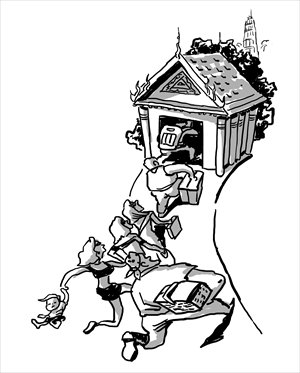Traveling means breaking out from the pack

There seems to be a trend among Chinese tourists who are expected to follow the latest film crazes. It is reported that Chinese visitors to Thailand will grow by at least 28 percent to about 3.2 million in 2013, this figure being driven by a low-budget Chinese comedy Lost in Thailand.
The film, since opening in mid-December, has racked up a box office of over 1.24 billion yuan ($199.8 million).
The tricky plot, where two rival Chinese businessmen, each with his own axe to grind, find intrigue in places such as solemn temples and the narrow streets of Chiang Mai, has struck a funny chord with Chinese audiences.
In December, almost 10,000 Chinese signed up for Thailand-bound trips, some of whom especially went to visit the spots that appear in the movie.
The craze for Thailand reminds me of another Chinese film If You Are the One. This 2009 blockbuster turned the Japanese island of Hokkaido into an in-demand tourism spot for Chinese tourists, as the romance between the characters spawned in Hokkaido where they were sightseeing.
China's economic boom in the past three decades has been the driving force behind Chinese people's desire to travel. Traveling has become a basic need rather than a luxurious option for many Chinese people.
China boasts the most tourists in the world; however, it also has the most people who don't grasp the real essence of travel.
Take their habit of following film crazes. Few have a designated travel destination. Those who follow Lost in Thailand may not even know why they choose to go there.
Even if they do have a particular place they long to see, finding time for it is quite a problem. Most working-class Chinese only have a few days' vacation each year besides public holidays which usually don't last long and often see a rush of travelers.
Without much time to make concrete travel plans, people often resort to package tours organized by travel agencies.
That's why Chinese tourists have left an international impression of only "sleeping on the bus, taking toilet breaks, snapping a few photos at scenic spots and remembering very little after the trips."
As time goes by, travel agencies might well explore an untapped niche market, proposing trips for the more enterprising Chinese solo traveler.
It's worth encouraging people to explore an exotic land after a movie's release. Unfortunately, exploration hasn't become a key word in Chinese minds yet when it comes to tourism.
Following any sort of craze can be attributed to Chinese people's lingering sense of collectivism.
I remember when I was a primary school student, when the teacher asked us to raise our hands if we thought an answer was correct, we didn't make our own judgment but looked around to see what the others did.
Having a psychology that wants to rely on others makes people unconsciously look for a common standard. When they find it, they will follow it and then make the "most sensible" choice.
At the same time, people sometimes follow a particular craze to develop their interpersonal relations. One who has watched Lost in Thailand and traveled there would feel close to another who has done the same.
It is a sad lookout for the future of Chinese travel that most ordinary Chinese just refuse to be that unique and thus miss out on the best part of exploring our planet.
The author is a reporter with the Global Times. wangwenwen@globaltimes.com.cn